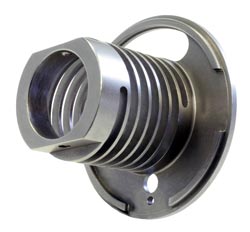
Posted to News on 21st Dec 2014, 21:27
Extension and compression springs machined from solid material
This article from Abssac explains some of the physics behind machined springs, and how this translates into real-world advantages.

In classical physics, a spring is seen as a device that stores potential energy, specifically elastic potential energy. Back in the 17th century the British physicist Robert Hooke developed what was to become known as Hooke's law of elasticity. This states that the extension of an elastic rod (its distended length minus its relaxed length) is linearly proportional to its tension, the force used to stretch it. Similarly, the contraction (negative extension) is proportional to the compression (negative tension).
All spring forms adhere to Hooke's Law. However, it is the linear accuracy of the relationship between the change in length (compression or extension) to the force applied that differentiates the machined spring from the traditional wire wound spring. As the name suggests, the machined spring is machined from a single piece of bar stock material rather than being made by coiling wire. Due to the geometry of the machined coil, the spring rate is totally linear in compression and extension. In fact spring rate tolerance can be as good as +/-1 per cent if required. This accuracy of spring rate is more or less impossible to achieve with a wound spring but is readily available in the machined spring format.

Why use machined springs?

Why are machined springs unique?
Quite simply, it is possible to have one, two, three of more spring coil elements in the single-piece spring construction. Multi-start springs deliver outstanding performance advantages, since the independent helixes are in the same cylindrical plane, which provides totally enhanced spring performance. In fact, machined multiple-start spring coils take the performance and reliability to levels simply not achievable by traditional wound springs.
Why use machined compression or extension springs?
A single-start spring provides a reaction force plus a moment. On multiple-start springs, virtually all internal moments are resolved within the spring itself, which translates into excellent compression or extension parallelism. Double- and triple-start variants make the loading points irrelevant on the radius of the spring but increase the accuracy of parallelism.
The machined spring product has proven itself in medical, aerospace, semiconductor and motorsport industries to name just a few. Wherever a wound spring is not able to meet an application's performance criteria, or a new spring design requires ultimate accuracy and repeatability, the machined spring is an excellent choice. The next time you require a spring in a critical or high duty cycle environment, the machined spring from Abssac may be the answer to your design problems.
Follow the link for more information about machined springs from Abssac.
Want the latest machine building news straight to your inbox? Become a MachineBuilding member for free today >>

















